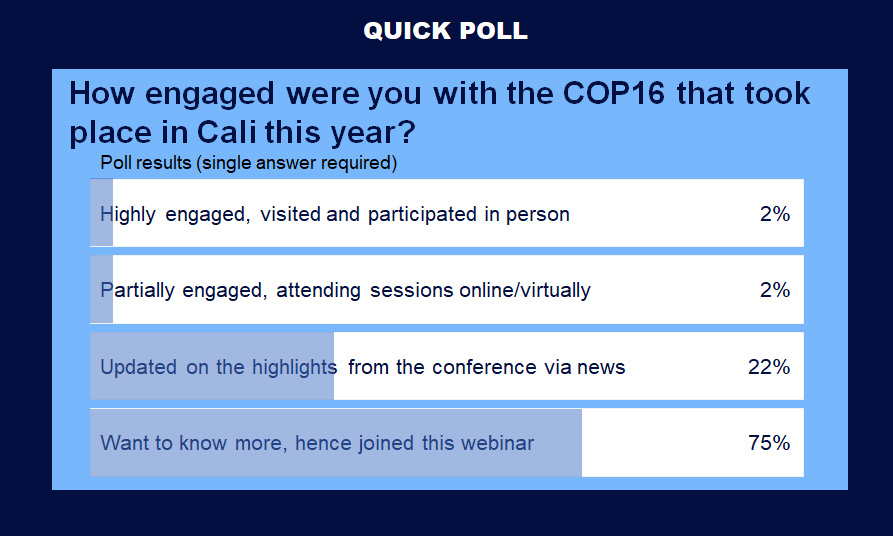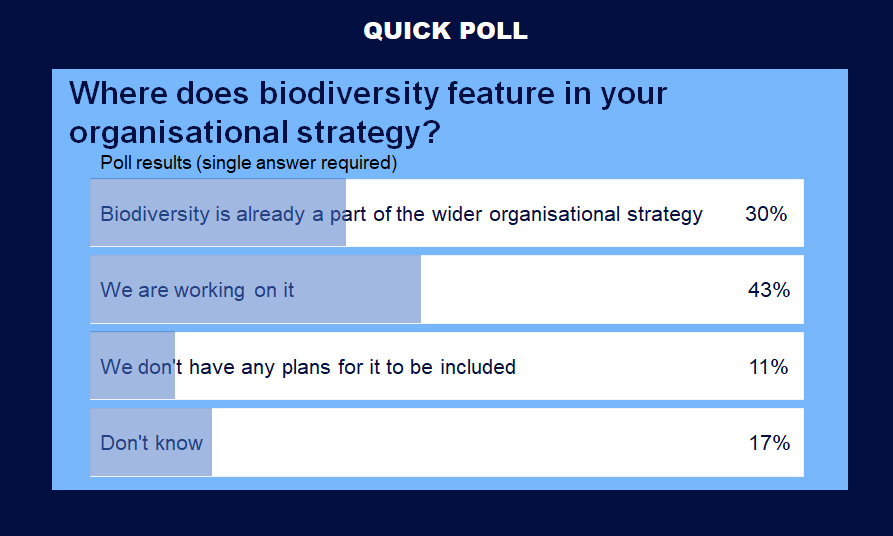COP16 Reflections: Act now for nature
While biodiversity has been overshadowed by other issues in the sustainability conversation, it is finally getting the attention it deserves, as evident in the insightful discussion among the expert panel at the SUEZ recycling and recovery UK webinar, “Reflections on COP16 – What’s next for global biodiversity?”.
The webinar, hosted by Chief Sustainability and External Affairs Officer Dr. Adam Read MBE, explored the panel’s insights about the COP16, as well as the challenges and opportunities stakeholders have in the fight for biodiversity.
The 2024 UN Biodiversity Conference of the Parties to the UN Convention on Biological Diversity (CBD COP16) held in Cali, Colombia brought together experts and changemakers for one goal – to advance the implementation of the Global Biodiversity Framework (GBF) agreed at COP15, to halt and restore biodiversity loss.
Although buzzing with energy, excitement, insights, and some progress made, it came short of delivering key expectations – creation of a financing model for monitoring progress against the GBF and failure of many countries to submit their National Biodiversity Strategies and Action Plans (NBSAPs). Global targets like protecting at least 30% of land and sea for nature by 2030 (“30 by 30”) have been set, but delivery plans and funding remain significant gaps.
Responding to one of the poll questions, 64% of webinar attendees would like to see the UK government fully support the production of a NBSAP, 51% wanted to see policies that will boost private finance, nature markets and pricing and 43% saw the need for more education and upskilling support. Other responses included seeing improved business collaboration and sector plan creation (38%) and a government mandate on disclosures such as the Taskforce on Nature-related Financial Disclosures (28%).
Bridging the communication and skills gaps
Institute of Environmental Management and Assessment (IEMA) Policy and Engagement Lead Lesley Wilson, who attended COP16, noted that while there was so much talk at the event about biodiversity, metrics and financing, two important topics were missing: communication and green skills. Truth is, if people don’t understand why biodiversity matters, they will not act. Communication needs to improve, especially for businesses. How does biodiversity impact supply chains or operations? Why should it matter to the bottom line? Without answers to these questions, biodiversity remains a distant concept for many companies.
One indication of this lack of communication about biodiversity in general (and COP16 in particular) is the webinar poll result that showed 75% of attendees wanted to know more about COP16, with only 22% being up to date about the highlights of the conference.
Equally important is education. Green skills aren’t just for ecologists. Every professional, from CEOs to accountants to engineers, every role needs a biodiversity lens. Understanding the impact of our work on nature – and vice versa – should become second nature (pun intended).
Funding nature without greenwashing
Funding has always been a hurdle for environmental progress, and biodiversity is no exception. One panellist spoke about the need to expand financing options by bringing private investors to complement public funding. However, this must be done in “a robust manner” and with projects in the right place. Admittedly, this fear of turning nature into a business is an idealistic view but panellists agreed that we need to be more pragmatic about getting businesses into the picture.
Another panellist pointed out that fixing this broken system requires embedding the cost of nature into business operations. Whether through levies, offsets or sustainable practices, businesses need to step up authentically, not just for compliance purposes but to really make meaningful changes.
Small steps with a nature-positive approach
Too often, biodiversity and climate are treated as separate issues, but they’re deeply interconnected. Take tree planting, for instance. A well-planned project can offset carbon emissions and create habitats for wildlife. But poorly executed, it might harm local ecosystems and/or fail to establish and fail to capture any carbon at all.
But the panel agreed: these two strategies must align using a nature-positive approach. Consider both outcomes together and taking care to avoid unintended consequences.
It’s easy to feel overwhelmed by the scale of the biodiversity crisis but change doesn’t have to start with grand gestures. Local efforts like Greater Manchester’s new green strategy combines urban development with nature restoration. Practical strategies like green space creation, tree planting and peatland restoration are a shining example of how local actions can lead the way for other, larger plans to take shape.
SUEZ UK’s sustainability champions are doing their part, too, leading initiatives like planting wildflowers and installing bird boxes and bug and/or bee hotels. These might seem like small steps, but they add up to create a culture of biodiversity awareness.
Empowering individuals through education and tools is also key. Tools like biodiversity best practice guides and nature-positive toolkits make it easier for businesses to measure impact and take meaningful steps.
The good news, according to results of another poll question at the webinar, is 43% of organisations are working on their biodiversity strategies within their respective companies, while 30% said biodiversity is already a part of their wider strategy. Around 17% are still unsure and 11% don’t have any plans as of yet.
The message from COP16 is simple: the time to act is now. The tools are there, awareness and interest are growing, and the need has never been more urgent. Whether it is governments stepping up with strategies or businesses embedding biodiversity into their operations, every step forward counts.
A huge thanks to our expert panel, IEMA’s Lesley Wilson, Greater Manchester Combined Authority Head of Natural Environment Samuel Evans and SUEZ UK Environment and Sustainable Development Lead, Leigh Broadhurst.
If you missed the live webinar session, you can watch it on-demand here.
For more in-depth information about COP16 and biodiversity-related issues, click on the following:
COP16: What happened at the 2024 UN Biodiversity Conference?
Nature positive business pledge
Environmental Services Association’s work on biodiversity

